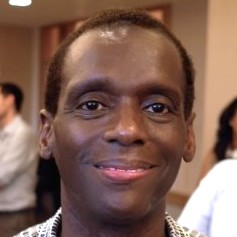 Marcellus Blount, an associate professor of English and comparative literature at Columbia University, died recently in New York City. He was the former director of the Institute for Research in African American Studies and the former director of the graduate program in African American studies at Columbia.
Marcellus Blount, an associate professor of English and comparative literature at Columbia University, died recently in New York City. He was the former director of the Institute for Research in African American Studies and the former director of the graduate program in African American studies at Columbia.
In addition to teaching at Columbia, Dr. Blount served as a research fellow at the Carter G. Woodson Institute at the University of Virginia, a visiting fellow at Wesleyan’s Center for Afro-American Studies, a Rockefeller Fellow at the Center for the Study of Black Literature and Culture at the University of Pennsylvania, and a visiting fellow at the W.E.B. Du Bois Institute at Harvard University.
A statement on the website of the department of English and comparative literature at Columbia reads: “We are devastated by the loss of our beloved friend and colleague. Marcellus had taught at Columbia since 1985, inspiring students with his courses on American and African-American literary and cultural studies. This news comes as a terrible blow to everyone who knew, worked with, and studied with Marcellus.”
Dr. Blount was a graduate of Williams College in Williamstown, Massachusetts. He earned a Ph.D. at Yale University. He was the co-editor of the book Representing Black Men (Routledge, 1995).


Marcellus was my roommate at Williams for four years. I will always remember him for his profound generosity and academic brilliance. I am eternally thankful for having known him in my life.
I am shocked and saddened to learn of the death of Marcellus Blount. He was one of my favorite teachers when I was a student at Columbia in the 1980s. I’ll never forget his arrival on campus. He was essentially hired to replace Amiri Baraka, who’d been enormously popular with the students and had taught the African-American literature classes. Given that background, many of us students were at first skeptical when we saw the new African-American literature teacher was a very young man, dressed in a blue blazer and carrying a squash racquet. Despite my misgivings, I immediately signed up for one of his classes and was immediately converted. He was a wonderful teacher, full of interesting ideas and enormous enthusiasm. His door was always open to any student who wanted to talk. At Columbia University, these were the years of the South Africa Divestment protests, which led into other protests over racism on campus. Very quickly, Professor Blount realized he couldn’t remain neutral. (The story is laid out in the Columbia Spectator.) He became a strong supporter of the activist students and was beloved by many. I will never forget him, and I’m sure hundreds of other former students of his feel the same way. His passing is a great loss.
I am saddened, as well as surprised, to learn about Dr. Marcellus Blount’s passing! My friendship with Marcellus dates back to 1973, to when he and I were second year students at New Dorp High School in Staten Island, New York.
For the next three years, Marcellus and I were classmates in a good number of classes, as well as sharing a two year membership in The National Honor Society! Marcellus ALWAYS showed he had exceptional talent in English classes, The Canterbury Tails being one of his favorites! I, however, preferred courses in Mathematics and Science.
In 1976, Marcellus and I would graduate together from New Dorp High School in a ceremony that was held in 95° heat at 4.30 in the afternoon on a dusty, dirty field culminated by Marcellus’ speech as valedictorian. New Dorp was a New York City Public High School with this particular graduating class, the class of 1976, having nine individuals going on to earn Ph.D. degrees!
After commencement from New Dorp, Marcellus attended Williams College to study English. Afterwards, attending Yale University for his Ph.D! In 1992, I happened to be teaching at New York University in the Department of Mathematics when I attended a seminar at Columbia University. After the seminar, I happened to walk in a building and discovered that Marcellus was on the faculty of the English Department. I had not seen, or heard, from Marcellus since we graduated from high school. I attempted to contact Marcellus a few times, however, for the few times I went to visit, he was not in his office at Columbia.
Since 1992/1993, many years have passed and life takes over! When I discovered that Marcellus had passed away six and a half years ago, I was deeply saddened! I cannot say that Marcellus and I were great friends, however, he and I were, nonetheless, still friends! I will try to end on an up note.
When Marcellus and I were in high school, we both took the College Board Achievement subject tests. On the English Composition, Marcellus scored 700, his Math Level I was 600 and Chemistry 510. Math Level 2 score was 720, Chemistry was 650 and English Composition was 350! Yes 350! Marcellus began to refer to me as “The illiterate genius,” something with which I can live with and, most especially, to remember my friend!
Sincerely,
Dr. Bobby Doran